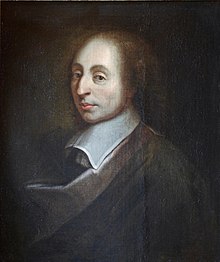Blaise Pascal
| Blaise Pascal | |
|---|---|

Painting of Blaise Pascal made by François II Quesnel for Gérard Edelinck in 1691.
|
|
| Born |
19 June 1623 Clermont-Ferrand, Auvergne, France |
| Died | 19 August 1662 (aged 39) Paris, France |
| Residence | France |
| Nationality | French |
| Era | 17th-century philosophy |
| Region | Western philosophy |
| School |
|
|
Main interests
|
|
|
Notable ideas
|
|
Blaise Pascal (/pæˈskæl, pɑːˈskɑːl/;French: [blɛz paskal]; 19 June 1623 – 19 August 1662) was a French mathematician, physicist, inventor, writer and Christian philosopher. He was a child prodigy who was educated by his father, a tax collector in Rouen. Pascal's earliest work was in the natural and applied sciences where he made important contributions to the study of fluids, and clarified the concepts of pressure and vacuum by generalising the work of Evangelista Torricelli. Pascal also wrote in defence of the scientific method.
In 1642, while still a teenager, he started some pioneering work on calculating machines. After three years of effort and 50 prototypes, he built 20 finished machines (called Pascal's calculators and later Pascalines) over the following 10 years, establishing him as one of the first two inventors of the mechanical calculator.
Pascal was an important mathematician, helping create two major new areas of research: he wrote a significant treatise on the subject of projective geometry at the age of 16, and later corresponded with Pierre de Fermat on probability theory, strongly influencing the development of modern economics and social science. Following Galileo Galilei and Torricelli, in 1646, he rebutted Aristotle's followers who insisted that nature abhors a vacuum. Pascal's results caused many disputes before being accepted.
...
Wikipedia
